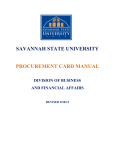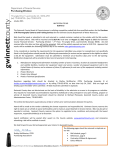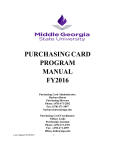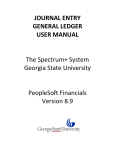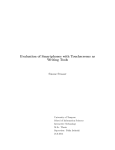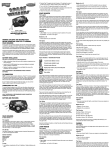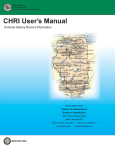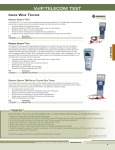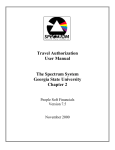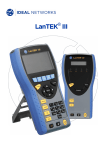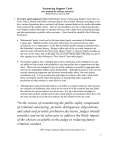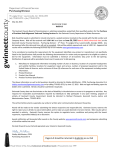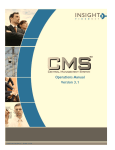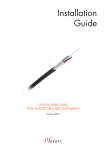Download Purchasing Card Manual - Savannah State University
Transcript
SAVANNAH STATE UNIVERSITY PROCUREMENT CARD MANUAL DIVISION OF BUSINESS AND FINANCIAL AFFAIRS REVISED 7/6/11 TABLE OF CONTENTS I. II. III. IV. PROGRAM OVERVIEW…………………………………………………………………….…2 ETHICS…………………………………………………………………………………………...2 USE OF THE PURCHASING CARD FOR PERSONAL PURCHASES PROHIBITED…..2 GENERAL INFORMATION…………………………………………………………………....3 A. Acknowledgement and Agreement for P-Cardholders …………………………………..3 B. Limitations on Vendors…………………………………………………………………..4 C. Merchant Activity Type Limits…………………………………………………………..4 D. Card Expiration and Reissue……………………………………………………………..4 E. Returning Purchasing Cards……………………………………………………………...4 V. CARDHOLDER INFORMATION……………………………………………………………..4 A. Who May Have a P-Card?...................................................................................................4 B. Cardholder Responsibilities……………………………………………………………... 5 C. The P-Card Can Be Revoked If…………………………………………………………..6 VI. USING THE CARD……………………………………………………………………………...6 A. What Can I Buy? ................................................................................................................6 B. What Can I Not Buy? ……………………………………………………………………7 C. Cardholder Spending Limits……………………………………………………………...7 D. Sales Tax……………………………………………………………………………….…8 E. How Can I Use the P-Card?……………………………………………………………....8 F. Telephone Orders…………………………………………………………………………8 G. Fax/Mail Orders…………………………………………………………………………..9 H. Web Purchases……………………………………………………………………………9 I. Over the Counter………………………………………………………………………….9 J. Disputes………………………………………………………………………………….10 K. Returns, Damaged Goods, Credit……………………………………………………......10 VII. PURCHASING CARD DOCUMENTATION AND REPORTING……………………........11 A. P-Card Statement…………………………………………………………………………..11 B. Expense Submission to the Office of Procurement………………………………………..11 VIII. LEGAL ISSUES………………………………………………..……………………………….12 A. Failure to Comply with Laws, Policies, and Procedures………………………………...12 B. Cardholder Background Checks…………………………………………………………12 C. Cardholder Credit Checks………………………………………………………………..13 D. Competitive Solicitation…………………………………………………………………13 E. Payment of State Sales and Use Tax……………………………………………………..13 F. Records Retention Requirements………………………………………………………...14 IX. CLARIFICATION ON CREDIT CARD FEES AND CONVENIENCE FEES.……………14 X. YEAR END ISSUES AND AUDITS………………………………………………………...….16 A. Year End Procedures…………………………………………………………….……….16 B. Auditing P-Card Activity………………………………………………………………...16 XI. APPENDIX……………………………………………………...……………………………..…17 A. Purchasing Card Account Summary……………………………………………………..18 B. Approval of Purchasing Card Expenses…………………………………………………19 C. Purchasing Card Transaction Log……………………………………………….……….20 D. Purchasing and Missing Receipt…………………………………………………………21 E. Cardholder Statement of Disputed Items………………………………………………...22 F. Sales and Use Tax Certificate Exemption……………………………………………….23 G. Order of Precedence……………………………………………………………………...24 H. Other Updates……………………………………………………………………………25 1 I. PROGRAM OVERVIEW The Department of Administrative Services (DOAS) State Purchasing awards the contract for statewide Purchasing Card services. The current vendor is Bank of America and the contract number is SWC 69695. The contract document can be accessed at http://www.doas.state.ga.us, and is an excellent source for information that may not be addressed in this manual. Once at the website: Click on “Procurement,” “Agency Guidelines and Procedures,” “P-Card Manual.” The University System Office participates in offering Purchasing Cards (P-Card) as a flexible purchasing tool for quickly and efficiently purchasing and paying for small dollar items. The PCard reduces the paperwork and processing time for the cardholder, as well as Accounts Payable and Procurement. The consolidated payment from Bank of America to vendors provides additional cost and time savings. The purpose of this document is to provide instructions for the issuance and use of the P-Card along with instructions for documentation, reconciliation, and review. II. ETHICS How do you define ethics? Ethics is the study of right and wrong, the principles governing the behavior of a Procurement Professional. PERCEPTION IS REALITY! As Procurement Professionals we must act with integrity, be accountable for our actions, and show respectability. Keep in mind that we are ultimately spending the taxpayer’s money. III. USE OF THE PROHIBITED PURCHASING CARD FOR PERSONAL PURCHASES Under no circumstances is a cardholder permitted to use the P-Card for personal purchases. Using the P-Card for personal purchases may result in disciplinary action, up to and including termination from State employment and criminal prosecution. The Official Code of Georgia, Annotated (O.C.G.A.), §50-5-80 states that any cardholder who knowingly uses the P-Card for personal purchases under $500 is guilty of a misdemeanor. A cardholder who knowingly uses the P-Card for personal purchases of $500 or more is guilty of a felony punishable by one to 20 years in prison. Supervisors and other approving officials who knowingly, or through willful neglect, approve personal or fraudulent purchases are subject to the same disciplinary actions as the cardholders. Criminal background checks are to be done on all cardholders as explained in Section VII, Legal Issues, paragraph B, of this policy. 2 IV. GENERAL INFORMATION A. ACKNOWLEDGEMENT AND AGREEMENT REGARDING THE PROCUREMENT CARD MANUAL AND DISCIPLINARY ACTION REGARDING MISUSE OF CARD This is to acknowledge receipt of Savannah State University’s revised Procurement Card Manual. I understand that as a Procurement Cardholder, I act as a Purchasing Agent within the University System of Georgia; therefore, I must adhere to all policy and procedures governing the State of Georgia Purchasing. Any violation to State and/or Board of Regents laws/policies will result in the following: If State Sales Tax is billed to my account, I must immediately contact the vendor for a full refund and obtain documentation for such. All Sales Tax not refunded by the vendor, I acknowledge, I will personally reimburse by payroll deduction or check made payable to Savannah State University for all Sales Tax not refunded by vendors within 30 days of the Statement Date. Under no circumstances am I permitted to use the P-Card for personal purchases. Using the P-Card for personal purchases may result in disciplinary action, up to and including termination from State employment and criminal prosecution. The Official Code of Georgia, Annotated (O.C.G.A.), §50-5-80 states that any cardholder who knowingly uses the P-Card for personal purchases under $500 is guilty of a misdemeanor. A cardholder who knowingly uses the P-Card for personal purchases of $500 or more is guilty of a felony punishable by one to 20 years in prison. If I submit the statement reconciliation to the Procurement Office after the reporting due date I will receive a written warning. After amassing three (3) written warnings my pcard will be revoked. Statements and associated receipts are due in Procurement no later than 5pm on the 15th day of the subsequent month in which the statement period ends unless it falls on the weekend, in which case the next business day will be the due date. I understand and agree that to the extent I do not use the laws, policies and procedures outlined in the Procurement Card Manual and stated briefly above; Savannah State University shall have the right to hold me personally responsible and liable for my negligence in accordance with said policy. Employee’s Signature Employee’s Name (printed) Date 3 B. Limitations on Vendors Cardholders must not make P-Card purchases from friends or relatives where cardholder has a financial interest. Cardholders must not accept any gift from any source when it is offered, or appears to be offered, to influence the decision-making regarding P-Card purchases. C. Merchant Activity Type Limits Specific types of businesses identified by a Standard Industrial Classification (SIC) Codes are restricted on the P-Card. D. Card Expiration and Reissue Bank of America will reissue P-Cards every 24 months to each active cardholder. Bank of America will forward to the Office of Procurement at least three months prior to the expiration of each credit card, a card reissue report that lists each active card schedule for renewal. The Office of Procurement must inform Bank of America in writing within 30 working days of receipt of the report which P-Cards should be reissued. No P-Cards will be reissued without written approval of the Office of Procurement. E. Returning Purchasing Cards The P-Card is the property of the State of Georgia. Upon termination or retirement, the card must be surrendered to the Procurement Office. V. CARDHOLDER INFORMATION A. Who May Have a P-Card? P-Cards are assigned to individuals selected by Department Budget Heads Generally assigned to individuals who have separate operating budgets Must be familiar with State of Georgia/DOAS purchasing Must attend one-on-one end user implementation/training with P-Card Coordinator Must sign an Acknowledgement and Agreement Regarding the Procurement Card Manual and Disciplinary Action Regarding Misuse of the Card P-Cards are issued in the employees name with “Savannah State University” on the card P-Cards are administered through the Office of Procurement. 4 B. Cardholder Responsibilities Sign the back of the P-Card Ensure the P-Card is used for legitimate business purposes only Maintain the P-Card in a secure location at all times Do not allow other individuals to use the P-Card Ensure that sales tax is not charged when making a purchase with the P-Card Adhere to the purchase limits and restrictions of the P-Card and ensure the total transaction amount of any single purchase does not exceed personal limit Obtain a receipt and/or packing slip for all transactions Reconcile the statement to the receipts and/or packing slips each month Submit a reconciled Procurement Card Summary form, (Attachment A), with original receipts and/or packing slips to the Office of Procurement. Attempt to resolve billing disputes directly with suppliers. If unable to resolve the dispute the cardholder should complete the Procurement Dispute Form, (Attachment E), and fax to Bank of America at 1-888-678-6046 (See page 8 for more information.) Ensure that appropriate credits for reported disputed items or billing errors appear on subsequent statements Immediately report lost or stolen cards to Bank of America at 1-888-449-2273 and notify the Procurement Office at first opportunity. A lost or stolen card should be reported to Bank of America Card Services Customer Service 24 hours a day, 365 days a year. Lost cards reported by telephone are blocked immediately. A replacement card must be requested through the Office of Procurement Immediately report unauthorized or fraudulent charges to Bank of America at 1-888-4492273 and notify the Office of Procurement at 912-358-4045/4046. Return the P-Card to the Office of Procurement upon termination of employment from the Savannah State University Complete periodic surveys to rate the effectiveness of the P-Card process and suggest areas for improvement 5 C. The P-Card Can Be Revoked If: The cardholder accepts a cash refund from a vendor for returned items Card is used for personal or unauthorized purposes An individual other than the cardholder uses the card A purchase is split to circumvent the limitations of the card. The P-Card cannot be used to circumvent the State of Georgia Purchasing Laws and Regulations. The order of precedence for ordering a product or service as stated on page 3-1 of the Georgia Procurement Manual (https://www.doas.state.ga.us) is as follows: 1. Mandatory Statewide Contracts 2. Existing State Entity Contracts 3. Statutory Sources of Supply Designated as a Mandatory Choice or Either Products certified as Mandatory by the State Use Council which includes some products provided by the Georgia Enterprises for Products and Services (GEPS). Georgia Correctional Industries Administration products which have been certified as Mandatory by the Commissioner of the Department of Corrections (GCI). 4. Choice of any of the following: Convenience Statewide Contracts GEPS Preferred Products (those items not certified as mandatory) State Purchasing Division Pre-Approved Piggyback Purchases State Purchasing Division Pre-Approved Consortia and Cooperative Purchasing Open Market Purchases Receipts are not provided for all transactions Procurement Card Summary form (Attachment A) is not submitted by the monthly deadline VI. USING THE CARD A. What can I buy? Office supplies Subscriptions Membership Dues 6 Registration for conferences and workshops with approved Authorization to Travel (form should be included in reconciliation documentation) Non-Inventory items up to $2,499.00 B. What can I not buy? Entertainment – food or drink Furniture - to assure continued adherence to State contracts (includes bookcases, file cabinets and chairs) Computers, laptops, hardware or software (Computer Services prior approval needed). Copiers Equipment valued at $2,499.00 and greater Motor vehicle fuel (gasoline) Personal-use items such as radios, coffee pots, microwave ovens, etc. Maintenance or service-type contracts (repairs/routine maintenance is allowable) Travel-related expenses - i.e. airfare, hotel, car rentals, meals and other incidentals. Professional or Consulting Services involving an employer/employee relationship Holiday decorations and cards Plants or cut flowers for office use Agency account related purchases (exception: Study Abroad Agency Accounts) C. Cardholder Spending Limits Adjustable limits per card include: Dollar amount limit per transaction = $2,499.00 Dollar amount limit per day = $2,499.00 (unless otherwise set) Dollar amount limit per month = varies by cardholder Current limits are set at $2,499.00 per day and $5,000 per month depending on the cardholders authority limit. 7 D. Sales Tax Savannah State University is a tax-exempt entity. The cardholder should be sure to make the vendor aware of our tax-exempt status prior to purchasing. Some vendors require a copy of Savannah State’s tax exempt certificate in ordered to honor this status. Tax-exempt forms are available from the Office of Procurement. The forms can be mailed, faxed or hand delivered to the vendor. A copy of a sales exempt form is included in this document as Attachment F. E. How Can I Use the P-Card? Telephone Orders FAX/Mail Orders WEB Purchases Over the Counter F. Telephone Orders Quicker delivery Obtain information on products and availability at the time of the order To Place a Telephone Order Have your P-Card ready before placing the call Always ask for the education/government sales representative Inform the vendor of tax exempt status Be sure to specify the shipping address to the vendor: Savannah State University Central Receiving/Evers Complex South Thompkins Road Savannah, Georgia 31404 Attn: Your Name or Department c/o W. Moore or S. Kanteh Complete all information on Purchase Card Transaction Log (Attachment C) 8 G. Fax/Mail Orders Catalog Orders Subscriptions Book Orders Supplies When mailing or faxing an order, be sure to complete all information needed on the order form and keep a copy for your records. For subscriptions, this may be the only receipt provided. Double-check the ship to address. Some catalogs and reorder cards already have an address on them. If necessary, fax or mail a tax-exempt certificate. Complete the Purchase Card Transaction Log. (Attachment C) H. Web Purchases Book Orders Registrations Office Supplies Print out completed registration forms, confirmations, and invoices to be used as supporting documentation Complete the Purchase Card Transaction Log (Attachment C) I. Over the Counter No shipping charges Eliminates risk of receiving incorrect or damaged merchandise Follow proper internal procedures from your department to obtain authorization to make the purchase Be certain that the amount total does not exceed your card’s single purchase limit Ensure that no sales tax is charged 9 Obtain a receipt at time of purchase Complete the Purchase Card Transaction Log upon return (Attachment C) J. Disputes Upon discovery of an incorrect amount charged for goods or materials received or a questionable purchase transaction appearing on a statement, the cardholder must immediately seek resolution with the vendor. Also, notify the Office of Procurement of any disputes. If no resolution can be made, a Procurement Dispute Form, (Attachment E), should be completed by the cardholder and faxed to Bank of America at 1-888-678-6046. Also, forward a copy of the completed form to the Office of Procurement. (FAX number 353-5199) If the disputed charge involves sales tax charged erroneously by the vendor, the amount of the tax cannot be disputed through Bank of America. Cardholders should make every effort to obtain a credit from the vendor for the amount of the tax. As stated in the Cardholder Responsibilities on page 3 and 4, it is the Cardholder’s responsibility to ensure that appropriate credits for reported disputed items or billing errors appear on subsequent statements. K. Returns, Damaged Goods, Credit If goods purchased with the P-Card need to be returned the cardholder should work directly with the supplier. Helpful Tips: Always retain boxes, containers, packing materials, packing slips, etc. until it is certain that the goods will not be returned. Some items such as computer peripherals cannot be returned without the original packing materials Read all enclosed instructions carefully. Phone numbers and special instructions are often included on packing slips or delivery receipts. Many suppliers require a “Return Authorization Number” before they will accept a return. If this information is not provided with the return, the package may be refused and no credit will be given. Insure that the charge for the returned item appears on a subsequent statement. If difficulties continue with the return, please see instructions for Disputes on page 8. 10 VII. PURCHASING CARD DOCUMENTATION AND REPORTING A. P-Card Statements Monthly statements from Bank of America will be sent to all cardholders within ten business days after the end of each monthly billing cycle. Verify all charges and credits agree with your Purchasing Card Transaction Log. (Attachment C - recommended) Supporting documentation should be obtained for all charges and credits. B. Expense Submission to the Office of Procurement Upon receipt of the statement from Bank of America, verify all charges and credits with supporting documentation and the Purchasing Card Transaction Log. (Attachment C recommended) The charges should appear on the Procurement Card Summary form along with the appropriate department/project and account to be charged. (Attachment A) Never delay the submission of this report to the Office of Procurement for disputed items. Credits will appear on subsequent months. Cardholders are required to have their Procurement Card Summary form approved by the Department’s Budget Unit Head. The Procurement Card Summary forms are required to be submitted to the Office of Procurement no later than 5:00 PM on the 15th of the subsequent month. Procurement Card Summary forms must have complete information. Namely: Account Department Project/Grant (if applicable) The P-Card charges will be posted to the accounts within ten business days after the submission deadline to the Office of Procurement. 11 VIII. LEGAL ISSUES A. Failure to Comply with Laws, Policies and Procedures Account holders, program users, cardholders or supervisors/approving officials who knowingly, or through willful neglect, fail to comply with the following may be subject to suspension or termination of account privileges or other disciplinary action, up to and including termination of employment and criminal prosecution to the fullest extent of the law. 1. Official Code of Georgia, Annotated (O.C.G.A.), sections related to governmental purchasing 2. Applicable requirements of the Georgia Procurement Manual 3. State Purchasing Card Policy 4. Internal policies and procedures governing procurement and the Purchasing Card Program. The State Cards Program Manager and State Purchasing Division reserve the right to withdraw any authority or delegated approval due to non-compliance with applicable laws, rules, regulations, policies, and procedures, or the terms of any conditional approval. B. Cardholder Background Checks O.C.G.A. §50-5-83(b)(12) requires criminal background checks on all employees hired for positions that are eligible for P-Cards. DOAS requires that these requirements be met for all employees using P-Card related accounts and products such as Ghost Cards, AP Cards and/or ePayables. 1. Existing Cardholders as of July 1, 2008: i. Agencies and Institutions must establish a schedule of criminal background checks for existing cardholders as of July 1, 2008, to ensure that backgrounds are checked prior to the next renewal date of the individual P-Cards. ii. If any criminal background check against existing cardholders reveals any misdemeanors or felonies related to financial wrongdoing, theft, or other act of dishonesty, the cardholder’s privileges are to be terminated immediately and notification sent to the State Cards Program Manager. 2. New Cardholders after July 1, 2008: i. For new cardholders after July 1, 2008, prior to receiving a P-Card, each Agency or Institution must perform criminal background checks on the prospective cardholders. ii. If any background check of new cardholders after July 1, 2008, reveals any misdemeanors or felonies related to financial wrongdoing, theft, or other act of dishonesty, the employee is not eligible to receive a P-Card. 12 C. Cardholder Credit Checks In addition to background checks for new and current cardholders, O.C.G.A. §50-5-83(b)(12) also requires credit checks on all employees issued a purchasing card after July 1, 2008. DOAS requires that these requirements be met for all employees using P-Card related accounts and products such as Ghost Cards, AP Cards and/or ePayables. D. Competitive Solicitation 1. O.C.G.A. §50-5-69 requires competitive bidding for all open-market purchases anticipated to be $5,000 or more. Use of the P-Card program as a method of payment does not relieve the program participant or the Entity of these responsibilities. i. Because of the legal bid limits, all account holders must have a Single Transaction Limit (STL) of less than $5,000, except as noted below in section C.2. ii. Account holders are prohibited from splitting a transaction between two or more transactions on a single account or two or more transactions on multiple accounts on the same day or on separate days in order to circumvent the bid process and/or any Single Transaction Limit, regardless of the level. 2. Where job responsibilities require account holders to make single purchases of $5,000 or more: i. The local Card Program Administrator can approve Single Transaction Limits over $5,000 with the approval of the account holder’s supervisor and the APO / CUPO when the purchases will be from a statewide contract, an Existing State Entity contract, or a mandatory source. However, this approval does not apply to open-market purchases. 3. Account holders who need to make open-market purchases of $5,000 or more must use the PeopleSoft e-Procurement system and the Procurement Office will initiate the bid process. E. Payment of State Sales and Use Tax 1. O.C.G.A. §48-8-3(1) exempts purchases made by Agencies from State Sales and Use Tax when payment is made with appropriated funds. 2. O.C.G.A. §48-8-3(8) exempts purchases made by the Board of Regents, Colleges, and Universities from State Sales and Use Tax. 3. Cardholders and account users must present the State Sales and Use Tax Exemption, Form to merchants upon request. This form is available with this document (Attachment F) 4. Account holders are responsible for ensuring that merchants do not charge tax. If taxes are charged, the account holder must contact the merchant to obtain a credit to the account. 13 ii. Credits cannot be obtained by any other method, including, but not limited to, cash, gift card, gift certificate, or store credit. iii. Documentation of attempts to obtain credit for any State Sales and Use Tax charged in error must be maintained with the documentation for the transaction where the tax was charged. F. Records Retention Requirements The Office of the Secretary of State maintains the official Records Retention Schedule for the State of Georgia. This information is available on their web site at sos.georgia.gov by searching for Records Retention Schedule. 1. Documents related to transactions are accounting records and must be maintained according to the requirements of Accounts Payable Files. 2. Documents related to the issuance of accounts to employees are accounting records and must be maintained according to the requirements of Credit Card Administration Records. IX. CLARIFICATION ON CREDIT CARD FEES AND CONVENIENCE FEES Many vendors charge a “credit card processing fee” or “convenience fee” for accepting credit cards including the State Purchasing Card or P-Card. These types of fees are strictly regulated by Visa and MasterCard (also called the Associations). “Convenience fees” for certain transactions can be paid if they are charged in compliance with Visa rules. (The State of Georgia P-Card and related accounts are Bank of America Visa accounts, so Visa regulations apply.) Other fees, such as “credit card fees”, “processing fees” or “surcharges” for example, are not allowed by Visa regulations and are therefore not permitted on the P-Card or related accounts. According to Visa’s Card Acceptance and Chargeback Management Guidelines for Merchants (Merchants is synonymous with Vendors) available on Visa’s website, credit card surcharges are not allowed. Merchants “may not impose any surcharge on a Visa transaction.” Convenience fees, however, are allowed under certain circumstances. According to the website: For merchants who offer an alternate payment channel (i.e., mail, telephone, or e-commerce) for customers to pay for goods or services, a convenience fee may be added to the transaction amount. If the merchant chooses to asses a convenience fee to its customers, the merchant must adhere to the following rules: The fee is being charged for a bona fide convenience of using an alternative payment channel outside the merchant’s normal business practice. The fee: - must be disclosed to the customer as a charge for the alternative payment channel convenience - is applied only to non face-to-face transactions 14 - must be a flat or fixed amount, regardless of the amount of the payment due - is applied to all forms of payment products accepted in the alternative payment channel - is included as part of the total transaction amount - cannot be added to a recurring transaction - is assessed by the merchant that provides the goods or services to the cardholder and not a third party The customer must be given the opportunity to cancel prior to the completion of the transaction Visa is very clear about what a convenience fee is and how and when they can be charged. As a result, many vendors that charge fees do so incorrectly and are therefore out of compliance with Visa regulations. Examples of common violations of Visa’s convenience fee policy include, but are not limited to, the following: - Charging a tiered or percentage based fee. Only a flat fee regardless of the transaction amount is allowed. - Charging a fee for transaction below or above a certain dollar amount. Convenience fees must be charged on all transaction regardless of amount. - Charging the fee in person, for face-to-face or point of sale transactions. The fees can only be applied to transactions via the mail, telephone or internet. - Charging only for Visa or credit card transactions. Convenience fees must be applied to all payment methods accepted via that channel. - Calling the fee a “processing fee”, “credit card fee”, “surcharge” or anything other than a “convenience fee”. The fee is designed to offset the cost of the convenience, not the cost of accepting credit cards. - Charging higher prices for credit card purchases versus checks or cash. Note: Vendors may offer a “cash discount” to customers paying with cash, in person. - Charging a convenience fee via the internet when that is the vendor’s only “normal business practice”. If the vendor only sells on the internet, there is no convenience versus coming in to a retail location, so no convenience fee can be charged. There are many ways a vendor’s actions can fall outside Visa’s guidelines. As such, only vendors in compliance with the guidelines shall be allowed to receive convenience fees via the P-Card and/or related accounts. One example of an allowable convenience fee is a utility that charges a convenience fee for paying a bill via the phone or internet versus having to come to an office and drop off a payment. As long as the convenience fee is a flat fee and is charged to all transactions accepted via the phone or internet (such as all card types, electronic checks, etc.), it is acceptable on a P-Card transactions. Convenience fees charged in accordance with the Visa guidelines quoted above are permitted on the P-Card or related accounts. All other charges, surcharges or fees are prohibited and should not be paid with a P-Card or related accounts. For clarifications, please consult your entity’s P15 Card Administrator or contact the State Cards Program Manager. Violations of the Visa guidelines should be reported to the State Cards Program Manager as merchants can be reported to Visa through Bank of America. X. YEAR END ISSUES AND AUDITS A. Year End Procedures Since the Fiscal Year End and the statement dates do not correspond, the Office of Procurement establishes a cut off date that allows better assessment of expenditures prior to closeout. This date is usually around the end of May and it does not apply to Grant funded P-Card holders. At that time, the Office of Procurement will access all purchases electronically from Bank of America up to the established cutoff date and forward via FAX or Email to the associated cardholder. Within two business days the proper account and department distribution for all purchases is to be returned to the Office of Procurement. The expense distributions are to be recorded on the Procurement Card Summary form. (Attachment A) Purchases after the established cut off date will appear in the subsequent fiscal and budget year. Supporting documentation is still required for submission to the Office of Procurement no later than 5:00 PM on the 15th of the subsequent month. Please be sure to separate the applicable documentation for each fiscal year. B. Auditing P-Card Activity All supporting documentation for all cardholders is subject to audit by the Georgia Department of Audits, the State Purchasing Division P-Card Department, the University System Office Internal Audit Staff, the Savannah State University Internal Auditor, and the Office of Procurement personnel involved in the P-Card process. 16 XI. APPENDIX Attachment A Purchasing Card Account Summary Form - This form contains space for departmental and account information, which are completed by the cardholder. This information is used by the Office of Procurement to expense charges to the various accounts. (Mandatory) Attachment B Supervisor Approval Form – This form along with the P-Card Account Summary Form, the original statement, the purchasing card activity log should be turn in as reconciliation documentation. Attachment C Purchasing Card Transaction Log - Used each time the Purchasing Card is used. This form is used by the cardholder to keep track of each purchase made. A copy of this form is sent to the Office of Procurement as part of supporting documentation. (Attachment C is a recommended form, not mandatory) Attachment D Purchasing Card Missing Receipt Form – This form is used in lieu of the original receipt when it is unobtainable from the vendor. Attachment E Purchasing Card Dispute Form – To be completed by the cardholder only after attempts have been made with the vendor to correct any disputed items. A copy of this form is to be sent to the Office of Procurement. Attachment F Sales Tax Exempt Form – This form is to be given to vendors who request documentation of tax-exempt status. Attachment G State Purchasing Required Order of Precedence Pyramid – This pyramid can be used as a reference guide to help ensure compliance with the State of Georgia laws, policies and procedures. Attachment H Other Updates Required by the State of Georgia 17 SAVANNAH STATE UNIVERSITY PURCHASING CARD ACCOUNT SUMMARY DEPARTMENT_______________________________________________________________ CARDHOLDER NAME ________________________________________________________ CARDHOLDER SIGNATURE ___________________________________________________ STATEMENT DATE ___________________________________________________________ INSTRUCTIONS 1. Summarize charges by account number and object code. 2. Attach originals of credit card statement, transaction activity log, credit card receipts/documentation to the original of this summary report and submit to Budget Unit Head for signature. 3. Make sure you retain copies of everything for your files. SPEEDTYPE: ________________________________________________________________ ACCOUNT AMOUNT Other Operating Expense 727140 $_______________ Supplies & Materials 714120 $_______________ Other Operating Expense - Registration 727110 $_______________ Other Operating Expense - Subscriptions 727120 $_______________ Other Operating Expense - Memberships 727130 $_______________ Repairs & Maintenance 715100 $_______________ Motor Vehicle Expense 712100 $_______________ _____________________ __________ TOTAL (Must equal to amount due per credit card statement) $_______________ $_______________ Prepared by: __________________________ Approved by: ___________________________ Cardholder Date Budget Unit Head Date Reviewed by: _________________________ Reviewed by: __________________________ P-Card Coordinator Date Grant Accountant Date 18 SAVANNAH STATE UNIVERSITY APPROVAL OF PURCHASING CARD EXPENSES FORM Statement Date _____________________________ I (or my appointed representative) have viewed my transactions and approved each expense. I have reviewed my statement to ensure a receipt or form is attached for every transaction amount listed. (Forms include: Refund, Change in Accounting, Credit Confirmation, Missing Receipt Affidavit or Disputed Item.) I agree to follow the established procedures for using the Purchasing Card as they are listed in the Purchasing Card User’s Manual. Cardholder Name (Print) Department Name Cardholder Signature Date I approve of the transactions listed during this period. Supervisor Signature 19 Date Savannah State University Purchasing Card Transaction Log Date Vendor 20 Item Quantity Price Total Purchasing Price Receipt Y or N 21 22 23 Attachment H 24 H. Other Updates 1. Fuel, mechanical repairs, and maintenance of State-owned or rental vehicles (Exceptions may be granted upon verification of procedures to enter costs into Vital, the State’s fleet management system administered by the DOAS Office of Fleet Management.) Note: Non-mechanical body shop repairs not covered under the state’s vehicle maintenance contract may be paid for with a program account. 2. Memberships and/or fees to wholesale shopping clubs or “warehouse” type retailers 25


























